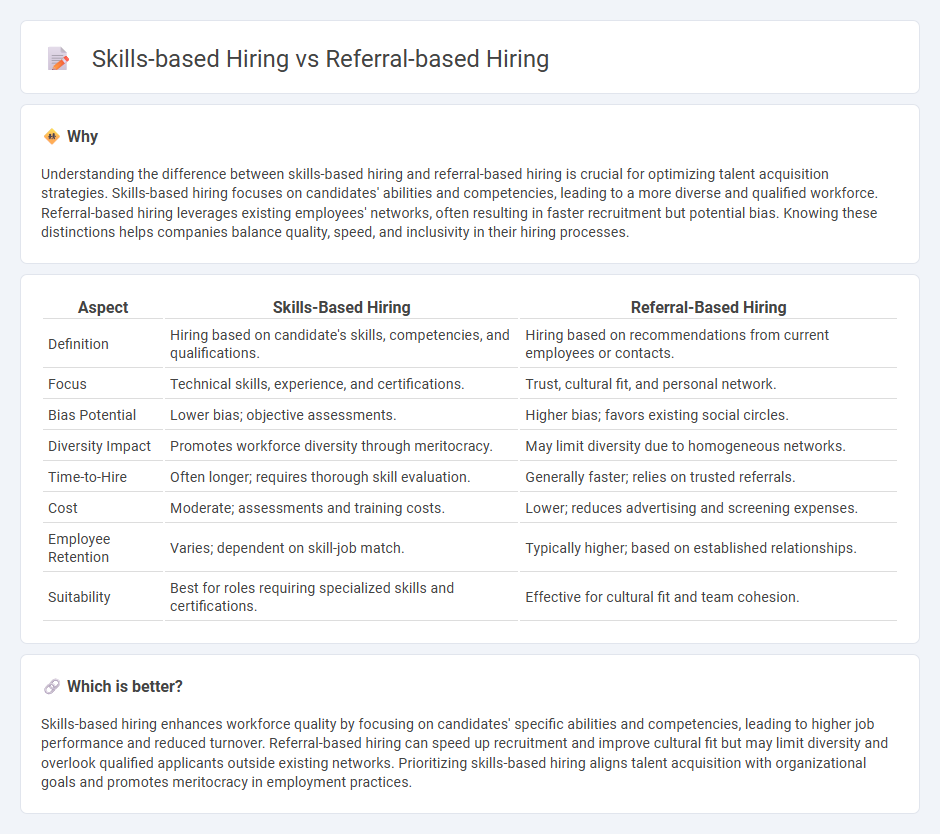
Skills-based hiring focuses on candidates' competencies and measurable abilities, promoting diversity and reducing bias in recruitment. Referral-based hiring relies on employee recommendations, often resulting in faster placements but potential homogeneity in talent pools. Explore the advantages and challenges of each approach to optimize your hiring strategy.
Why it is important
Understanding the difference between skills-based hiring and referral-based hiring is crucial for optimizing talent acquisition strategies. Skills-based hiring focuses on candidates' abilities and competencies, leading to a more diverse and qualified workforce. Referral-based hiring leverages existing employees' networks, often resulting in faster recruitment but potential bias. Knowing these distinctions helps companies balance quality, speed, and inclusivity in their hiring processes.
Comparison Table
| Aspect | Skills-Based Hiring | Referral-Based Hiring |
|---|---|---|
| Definition | Hiring based on candidate's skills, competencies, and qualifications. | Hiring based on recommendations from current employees or contacts. |
| Focus | Technical skills, experience, and certifications. | Trust, cultural fit, and personal network. |
| Bias Potential | Lower bias; objective assessments. | Higher bias; favors existing social circles. |
| Diversity Impact | Promotes workforce diversity through meritocracy. | May limit diversity due to homogeneous networks. |
| Time-to-Hire | Often longer; requires thorough skill evaluation. | Generally faster; relies on trusted referrals. |
| Cost | Moderate; assessments and training costs. | Lower; reduces advertising and screening expenses. |
| Employee Retention | Varies; dependent on skill-job match. | Typically higher; based on established relationships. |
| Suitability | Best for roles requiring specialized skills and certifications. | Effective for cultural fit and team cohesion. |
Which is better?
Skills-based hiring enhances workforce quality by focusing on candidates' specific abilities and competencies, leading to higher job performance and reduced turnover. Referral-based hiring can speed up recruitment and improve cultural fit but may limit diversity and overlook qualified applicants outside existing networks. Prioritizing skills-based hiring aligns talent acquisition with organizational goals and promotes meritocracy in employment practices.
Connection
Skills-based hiring focuses on evaluating candidates' specific abilities and competencies, ensuring a precise match between job requirements and applicant qualifications. Referral-based hiring leverages trusted employee recommendations to identify candidates who not only possess relevant skills but also align with organizational culture. Combining skills-based criteria with employee referrals enhances the quality of hires by merging objective skill assessment with insider insights.
Key Terms
Network Connections (referral-based)
Referral-based hiring leverages strong network connections to identify candidates trusted by current employees, reducing time-to-hire and improving cultural fit. This method often leads to higher retention rates as referred candidates are pre-vetted through established relationships. Explore the advantages of network-driven recruitment to enhance your talent acquisition strategy.
Competency Assessment (skills-based)
Competency assessment in skills-based hiring evaluates candidates through practical tests and performance scenarios to ensure alignment with job requirements, enhancing workforce quality and reducing turnover. Unlike referral-based hiring, which relies on personal recommendations and may introduce bias, skills-based hiring prioritizes objective measurement of abilities, promoting diversity and inclusivity. Discover how implementing competency assessments can refine your recruitment strategy and boost organizational success.
Bias Reduction
Referral-based hiring often perpetuates biases by relying on existing employees' networks, which can limit diversity and reinforce homogeneity within organizations. Skills-based hiring mitigates bias by evaluating candidates solely on their abilities and qualifications, promoting a fairer and more inclusive recruitment process. Explore effective strategies to implement skills-based hiring and reduce bias in your talent acquisition efforts.
Source and External Links
Employee referral programs: A complete guide for success - Employee referral programs are a highly productive hiring method where current employees recommend talent from their networks, leading to higher quality candidates, better retention, and reduced hiring costs, with referrals accounting for up to 45% of internal hires despite being only 7% of applicants.
Why Employee Referral Programs Are a Game-Changer ... - Employee referral programs improve recruitment by delivering pre-vetted, culturally aligned candidates who tend to meet job requirements better and shorten the hiring timeline due to faster screening and onboarding.
Five Best Practices For Referral-based Hiring - Referral-based hiring leverages social networks to produce high productivity and longer tenure among new hires while reducing monitoring costs, with hiring managers benefiting from knowing candidates' abilities beforehand and referred employees motivated to perform well for their network.
 dowidth.com
dowidth.com